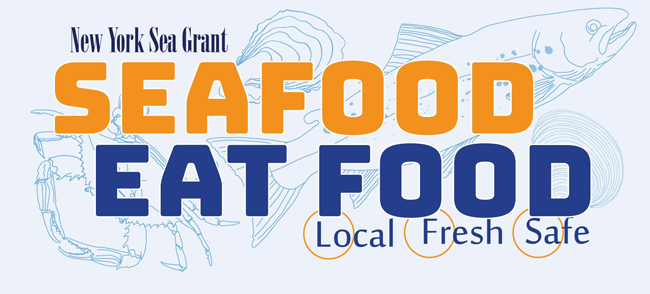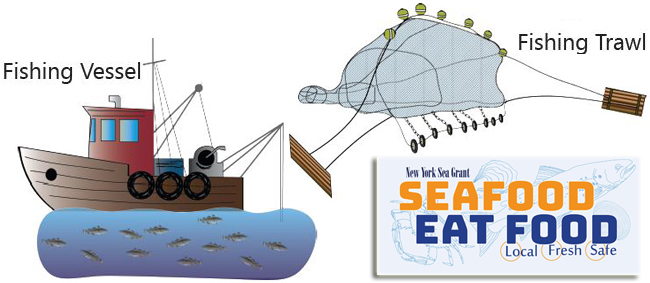NYSG's education efforts target an upcoming generation of seafood consumers who value locally grown and healthful food
Stony Brook, NY, November 7, 2016 - Currently 94% of the seafood eaten in the U.S. comes from overseas. However, there is a growing interest among consumers to source food locally and sustainably.
With an emphasis on keeping the supply local, fresh and safe, New York Sea Grant’s "Seafood Eat Food" workshop was developed for seafood retailers, restaurateurs, chef educators, culinary students, chefs, food media, food service professionals and others in the industry.
"Our aim with this workshop is to increase knowledge and awareness of the safety and sustainability of local and U.S. farmed seafood and how it can complement wild fisheries," says NYSG Seafood Safety and Technology Specialist Michael Ciaramella.

The full-day public workshop is being held today (Monday, November 7th) at Suffolk County Community College’s (SCCC) Culinary Arts and Hospitality Center in Riverhead, NY (20 East Main Street).
The event includes a morning tour of Widow’s Hole Oyster Company and lunch on the North Fork followed by an afternoon workshop and evening social gathering. Key topics for the public workshop include how seafood is kept safe, its nutritional benefits, seafood sustainability, the availability of farmed and wild seafood in New York and the changing consumer base. A panel discussion with industry professionals is being followed by a reception showcasing local seafood to highlight the versatility and quality that it can provide.
In realizing that food professionals need to meet the growing demand for healthy, delicious and safe seafood, a priority of the workshop is exploring ways in which these professionals can take advantage of local and U.S. farmed seafood as a complement to wild fisheries.
One of the reasons for this focus, says Ciaramella, is that it opens the door for increased engagement with millennial consumers who, by 2025, will make up 75% of the workforce: "Millennials are well educated, highly connected, eat out more often and seek adventure and creativity in the food they eat. This generation’s mostly 20 and early 20-somethings want to connect on a more personal level with the people producing their food as a means of building trust and truly understanding where the food they eat comes from.
Since approximately two-thirds of all seafood consumption in the U.S. takes place in restaurants and food service establishments, Sea Grant realizes that food service professionals could play a large and impactful role in the process of courting interest from within this key demographic: “It’s important for these professionals to understand how and where seafood is sourced and managed so that they can pass along that information to their patrons,” says Ciaramella.
“In helping to bridge the connection, we're looking to secure a place in the hearts and stomachs of present and future generations for local farmed and fished seafood."

Consumer preference for locally sourced sustainable seafood and a growing demand has pushed the aquaculture industry to be constantly advancing its practices to achieve safe and sustainable production. This trend opens new opportunities for the small aquatic farmer. Local fish farms create jobs, spur economic activity and increase the availability of fresh seafood.
In late October, The National Sea Grant College Program announced $3.4 million in federal funding to support this workshop as well as other aquaculture research and outreach efforts in a number of the country’s other Sea Grant programs. In total, the funding supports 11 aquaculture research projects and 23 projects to organize and conduct conferences and workshops to transfer aquaculture information. For more, see http://bit.ly/2f48Quc.
For more information, contact Ciaramella via email, mc2544@cornell.edu, or phone, (631) 632-8730. And for more on NYSG's Seafood Safety and Technology initiatives, check out www.nyseagrant.org/seafood.
More Info: New York Sea Grant
New York Sea Grant (NYSG), a cooperative program of Cornell University
and the State University of New York, is one of 33 university-based
programs under the National Sea Grant College Program (NSGCP) of the
National Oceanic and Atmospheric Administration (NOAA). The NSGCP
engages this network of the nation’s top universities in conducting
scientific research, education, training and extension projects designed
to foster science-based decisions about the use and conservation of our
aquatic resources. Through its statewide network of integrated
services, NYSG has been promoting coastal vitality, environmental
sustainability, and citizen awareness about the State’s marine and Great
Lakes resources since 1971.
New York Sea Grant maintains Great Lakes offices at SUNY Buffalo, the
Wayne County Cooperative Extension office in Newark and at SUNY Oswego.
In the State's marine waters, NYSG has offices at Stony Brook University
and Stony Brook Manhattan, in the Hudson Valley through Cooperative
Extension in Kingston and at Brooklyn College.
For updates on Sea Grant activities: www.nyseagrant.org has RSS, Facebook, Twitter, and YouTube links. NYSG also offers a free e-list sign up via www.nyseagrant.org/coastlines for its flagship publication, NY Coastlines/Currents, which is published several times a year.